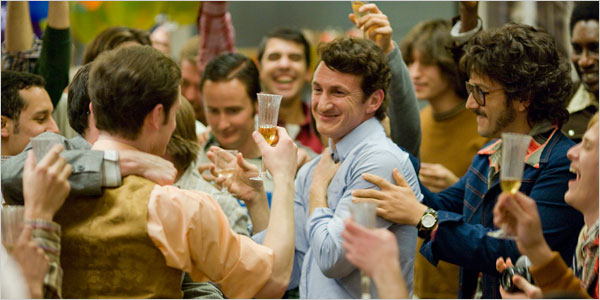Andy over at Fandango Groovers Movie Blog had a great idea for a blogathon. He was inspired by the upcoming movie Captain America: The Winter Soldier. Unless you yourself have suffered a similar fate, you're likely aware that Cap was actually frozen for nearly 70 years. Andy wondered aloud to his fellow bloggers what ten movies would we recommend for him to watch. The only rule is that the movie must have been released during the time he was cooling his heels, from 1943 to 2011. I can handle that.
Aside from saving our tails, he has some catching up to do with the rest of society. After all, the country as he knew it is entirely different from the one he woke up to. Think about it. In 1943, America was basically an apartheid. When Cap was thawed out, he immediately went to work for a black man. And that's only one difference. With that in mind, I didn't want to just offer up 10 classic films and/or pull one from every decade. As enjoyable as that might have been I didn't think it was the most beneficial to a man in his particular situation. I picked 10 films that I think will help him best understand what his beloved country has become and where we might be going. In no particular order, here they are:
United 93
(2006)
Since September 12, 2001 we've been living in a post 9/11 world. That only makes sense since this is the single biggest tragedy on American soil since Pearl Harbor. Any understanding of America as it is currently constituted must include this fateful event. This examination presents the story of the one plane that did not hit its target. Honestly, I've never even watched this movie myself. When it came out, I avoided it as being too soon and have never bothered with this or a number of other films on the subject. However, for a person with no (or extremely limited) knowledge of 9/11, I figured he may as well start with the movie plenty of people say is the best and most honest of the bunch.
Eyes on the Prize
(1987)
In the opening, I alluded to the drastic change in race relations. No, things aren't perfect. Not even close. However, there have been major improvements during the time Cap was away. In looking for a "regular" movie to help him understand what went on, I found that most covered a singular aspect or event pretty well. The problem is almost all of them depend on at least a working knowledge of what went on during the early and middle twentieth century. Eyes on the Prize probably isn't something he can watch in one sitting. It's a six-hour PBS documentary that has been hailed as the most comprehensive examination of the Civil Rights Movement in this country. It spans the years 1952 through 1965 and details the growing pains of a nation.
Woodstock
(1970)
The 1960s is known as our most turbulent decade. Eyes on the Prize details one side of things. In reality, the Civil Rights Movement was a symptom of our changing ideals. Along with those ideals, our attitudes and our music changed to such a degree that they simultaneously reflected and informed everything about us. It all culminated in three days of sex, drugs, and rock-n-roll in upstate New York. This documentary captures the spirit of the youth that were changing the world...at least the ones not permanently stuck in a foggy haze.
Young Frankenstein
(1974)
Everything doesn't have to be dreadfully serious and "educational." This Mel Brooks classic is neither, yet it still teaches us about ourselves. Though it's forty years old, it still exemplifies our collective personality. We're a bunch of self-aware, snarky, sarcastic smart-asses using the past for both inspiration and target practice. Quentin Tarantino's entire career is built on precisely this. Instead of going with one of QT's flicks, I chose this since it skewers something Cap is familiar with and is just damn funny!
Norma Rae
(1979)
The role of women and labor laws in general have greatly improved since the 1940s. Why not a movie that captures both? Sally Field's Norma led the unionization of the factory where she worked. True, everyone isn't in love with the idea of unions, but it's hard not to be swept up in the story of a woman fighting for her basic rights and those of her fellow co-workers.
Milk
(2008)
Here, we have the story of Harvey Milk, America's first openly gay elected official. At its core, it is another movie about a person standing up for what they believe in. However, what's on the surface might be the toughest thing for Cap to wrap his head around. Remember, he's a man of the 1940s. Its highly likely he's never met a person he knew to be gay and saw the public shunning of anyone rumored to be. Sexuality, and the right to not be persecuted for it, are at the forefront of Civil Rights issues in this country. So before diving into an episode of Glee, he should start here.
Jaws
(1975)
America loves its horror movies and its summer blockbusters. With Jaws, we get a classic of the former and the genesis of the latter. Its a movie that tapped into a very basic fear to create mass paranoia. Not that Captain America would ever be scared, but maybe he could relate to the feeling of helplessness in the face of nature engendered by this movie. As a bonus, he'll be introduced to Steven Spielberg the same way most of us were. Whatever you're personal opinion of the man doesn't change the fact that he's made some of the nation's most beloved films of all-time.
The Social Network
(2010)
Something Cap had to notice was that there are computers everywhere. It smacked him in the face when he boarded SHIELD's flying command center in The Avengers. The truth is this is probably fairly close to what he thought he early 21st century. What he was probably less prepared for was all the mobile computers people were walking around with: smart phones, tablets, etc. Even more unfathomable was probably all the completely inane things we're doing with them. We live in an age where people act upon the need to tell a thousand of their closest friends whom they've never met that they're taking a dump. Information, no matter how useful is constantly disseminated. This is also the age of billionaires who became such by electronically shrinking the gap between you and your fellow man even as it physically widens he same gap. What better movie to demonstrate this than the story of Facebook?
Sugar
(2008)
I thought about going with a football movie, here. After all, it is by far the most popular sport in the country. However, went Cap went under baseball held that spot. Therefore it's a reasonable assumption to say he's more of a baseball guy. I imagine most of you have no problem with that logic. On the other hand, you're probably wondering why not Major League? Bull Durham? Field of Dreams? Any of the other classic baseball flicks? The answer is I'm trying to dig a little deeper. This movie doesn't merely romanticize the sport or deliver a ton of laughs. Sugar chronicles the journey of a young man from his native Dominican Republic to the heartland of America on his quest to make it to the big leagues. Obviously we touch upon Latino immigration, though as a fish out of water tale, not from a political standpoint. We get a hint at how prevalent Hispanic players are in baseball, these days. Finally, we also deal with the less glamorous side of sports where most athletes exist.
Colors
(1988)
Unfortunately, gangs are also a prominent part of our landscape. Their presence is evident in urban murder rates all across the land. They have been with us for over a century in some form or another. However, the current makeup of gang culture as largely a two party system with lots of tiny affiliates had its start in Los Angeles in the 70s. Their activities escalated with the onset of the crack era and spread across the country in an easterly fashion. Colors gets Cap in on ((virtually) the ground floor and exposes him to a troubling facet of inner-city life.












No comments:
Post a Comment